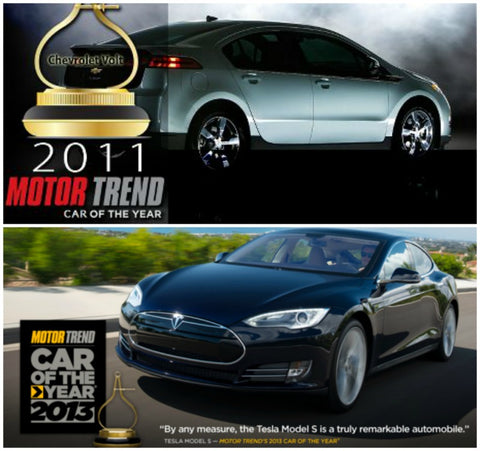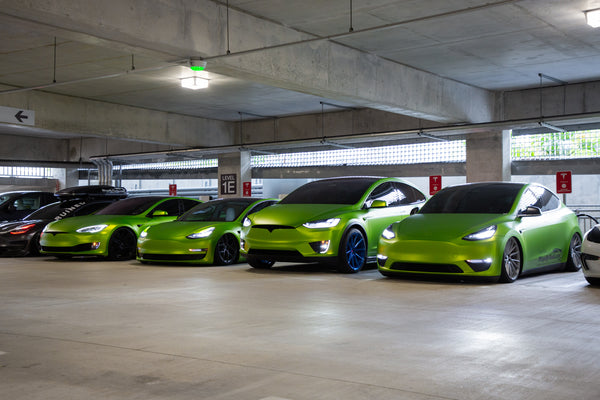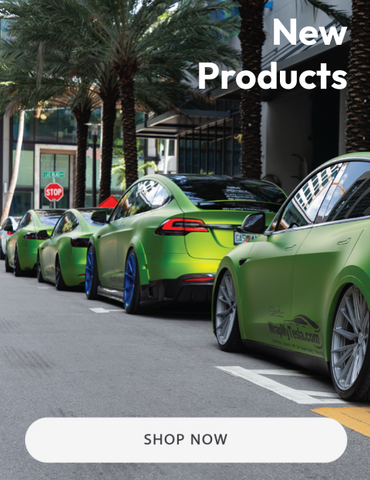The complicated history of GM and Tesla / Part 2
Editors note: In light of GM's Chevy Bolt announcement this week, we wanted to revisit our original post (which published nearly a year ago, almost to the day). It's high time we re-evaluate where these two carmakers have been, where they are (now), and where they're going based on the big news at CES.
This week at the Consumer Electronics Show (CES), GM's Chevy Bolt unveiled its pre-production 200-mile electric vehicle with a $30,000 price point. This is purported to be direct competition for the Model 3, Tesla's forthcoming 200-mile electric vehicle with a $35,000 price point. There has been breathless media analysis pitting these American automotive brands against one another.
 |
Above: A tale of two electric vehicles... (top) GM's Chevy Bolt, (bottom) Tesla Model S
However, regardless of how we forecast the the future... it's important to understand the complicated history revolving around these two companies, GM and Tesla, and how each has pushed the other forward in unexpected ways. First it's key to go back in time to GM's EV1 vehicle, launched in 1996, and understand it's "unusual" demise. In many ways, this unfortunate incident served to inspire Elon Musk to move forward with his vision for Tesla. To better understand how it all transpired, check out Elon Musk tell the story of GM's EV1 in a rather emotional account of what occurred (39 min 46 sec - 42 min 00 sec)...
Above: Elon Musk tells the story of GM's EV1 (Youtube: Computer History Museum)
Tesla, under Elon Musk's visionary leadership and spurred on by GM's EV1, moved ahead to create the Tesla Roadster, a 200-mile range electric supercar, launched in 2008. The Roadster, in turn, was the catalyst for GM's mercurial executive, Bob Lutz, to "green light" the Chevy Volt. As Newsweek reported, "GM engineers didn't want to switch gears to a plug-in electric, which they insisted couldn't be run on lithium-ion batteries. The turning point came when tiny Tesla Motors, a Silicon Valley start-up, announced... it would produce a speedy electric sports car powered by those same laptop batteries. 'That tore it for me,' says Lutz. 'If some Silicon Valley start-up can solve this equation, no one is going to tell me anymore that it's unfeasible.'"
 |
Above: (top) GM EV1, (bottom) Tesla Roadster
Later, discussing the Volt, Musk went on to say he thought that GM, "sort of created something that's a bit of amphibian," adding that GM, "essentially split the baby between gasoline and electric, so it's OK but not great." Nevertheless, GM's Chevy Volt went on to win the coveted Motor Trend Car of the Year (COTY) award in 2011. And guess which car launched in 2012 won the COTY award in 2013? Ironically, the all-electric Tesla Model S won in the first-ever unanimous COTY award decision by the judges. Based on the Volt's lackluster sales contrasted with runaway sales (and critical success) of the Tesla Model S, GM announced that they assigned a team to study Tesla. And defensively, GM actually supported a bill in Michigan to outlaw Tesla from selling in the state.
 |
Above: (top) COTY 2011 Volt, (bottom) COTY 2013 Model S [Source: Motor Trend]
However, looking back at Tesla, former GM CEO Dan Akerson admitted, “No other car manufacturer has achieved a global brand so quickly, it’s a huge accomplishment for this hard-charging executive [Elon Musk],” said Akerson. “Teslas are beautifully designed with great pick up and first class engineering. Musk has challenged the industry and it has to respond. He’s running between the legs of elephants.”
Fast forward... and that brings us full circle to the Consumer Electronics Show where, this Wednesday, according to The Verge, "GM CEO Mary Barra threw some shade at Elon Musk and Tesla during her CES keynote today. She touted GM's extensive franchised dealer network as a key advantage over Tesla's much smaller, corporate-owned network."
 |
Above: (left) Tesla CEO Elon Musk (right) GM CEO Mary Barra [Source: Fortune]
However, Benzinga reported that General Motors also quietly revealed something else on Wednesday, "that it would not use 'over-the-air' (remote or OTA) upgrades... [GM is] fundamentally limited and disadvantaged because Dealership Network Rules prohibit OTA updates... However, Tesla’s position is different, as auto dealership rules do not apply to its cars. Thus, its vehicles can perform OTA updates. The company [Tesla] has perfected its OTA Technology."
To boot, Motley Fool notes that GM's rhetoric "lacked ambition" as GM's EVP Alan Batey, "played down expectations for large sales volumes with the Bolt... suggest[ing] that the primary reason for the Chevy Bolt's development could simply be to comply with regulations, 'There are certain states in the U.S. where you need to sell electric vehicles if you're going to be able to sell your total portfolio' Batey said. 'As part of that, we have a need to have a range of electric vehicles.'" Writer Daniel Sparks concludes: "Unlike GM, Tesla has ambitious expectations for its lower-cost electric vehicle. The company plans to ramp-up production of its Model 3 to several hundred thousand vehicles per year by 2020."
Who will prevail? We'll keep watching. As the stakes are raised with the forthcoming Chevy Bolt and Tesla Model 3, it's likely that their features, performance, and technology will be worthy of more detailed analysis.
The bigger picture? It will be very interesting to see how these two American car companies, GM and Tesla, continue to push each other, duke it out, and accelerate the race for vehicle electrification in the coming years.
====
Images: [Source: Tesla Motors / GM]




